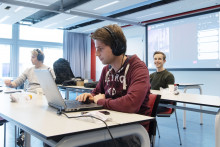What is the general picture that emerged?
'The majority are not doing too badly, that is a justified conclusion. But that is not the same as things going fine. A minority suffers from severe stress, anxiety or depression. But for a significant part, about half, the complaints are mild to moderate. Female and international students - with the exception of German students - are generally more sensitive to this.
It is also striking that about three quarters of the first-year students are committed and motivated. They feel at home in the study programme and do not think about quitting easily. Face-to-face contact with a lecturer did not appear to be a significant predictor of this. This does apply to the quality of the online education and the general support from lecturers. Freshmen want to feel seen, heard, supported and approached.'
So lecturers have to go the extra mile?
'No, not necessarily. One of the recommendations to students is that they should give feedback to lecturers. They themselves have a role in the perception and quality of education; it is two-way traffic. For instance, as a teacher I explicitly ask everyone to turn on their webcam. That way I can see their faces, I can see who understands and who doesn't, and I can respond accordingly. That also makes it much more motivating for me from behind my laptop. In general, you can make sure that students feel seen with relatively small interventions. And we see that they fare better if they find the lectures useful.'
You collected the data in November. In the meantime, the corona measures have become stricter...
'That's why we don't think things have improved in the last few months. Many students did not get the chance to establish a good support network because of the measures, and that is a cause for concern.'
This links up with a striking result: the majority appears to be mainly concerned about a less enjoyable life as a student. There goes 'the best time of their lives'.
'In addition, 40 percent are afraid that their studies will be delayed. But indeed, eight out of ten fear that an enjoyable time as a student will be at stake. That's not surprising; it's the first time you're away from your parents, you choose your own path and get a taste of that freedom. Contact - also emotional - with others is a very positive boost to your well-being. It certainly helps that study programmes and associations organise a lot online, but unfortunately there is also a lot that cannot. Fortunately, we also see that study advisors contribute to reducing these worries.'
You also made the comparison with previous research. Can you say that the crisis has made existing problems worse?
'No, I was very afraid that the situation would be even worse than the research of my colleague Saskia Kelders one and a half years ago. The results of that were quite shocking, in fact. But it wasn't worse, although you always have to be careful. A different group of students took part in that study, possibly for different reasons. In research into well-being, you soon get the tendency that people who are not feeling well anyway are more inclined to participate. That is inherent to the context.'
At the start of the research, you indicated that you did not want to get too hung up on clinical outcomes, but that you mainly wanted to provide help and feedback. How was that done?
'In January, everyone received personal feedback via a tool co-developed by the BMS Lab and the Bridge the Gap project. One of the most important things we did was to make the situation more transparent for each student: how do you score compared to norm scores? And compared to your fellow students? Based on that, we offered tips and suggestions, because self-perception certainly does not say everything. The feedback can help students, even if it only means that you know you are not alone. The UT also has a good support network, with study advisors and student psychologists. Sometimes students need a push and they need to be alerted to the infrastructure.'
Finally, how to proceed with this project and its results?
'It is important to look at what factors help or hinder. The research among first-year students has now been completed, although we are now also asking second-year students to participate. And we can certainly look at whether and how we can give this a place within the entire student well-being project. In any case, the basis for a feedback tool has been established, which can be used again and more widely.'






